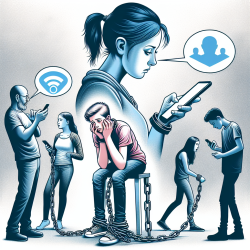Introduction
In today's digital age, mobile phones have become an integral part of our daily lives. However, the increasing dependency on mobile phones, especially among teenagers, is a growing concern. Recent research by Liu et al. (2019) highlights the impact of parental phubbing on teenagers' mobile phone dependency, providing valuable insights for practitioners working with children.
Understanding Parental Phubbing
Parental phubbing, a term derived from "phone" and "snubbing," refers to the act of parents ignoring their children by focusing on their mobile phones. This behavior can significantly influence teenagers' attitudes and behaviors towards mobile phone usage.
Key Findings from the Research
The study conducted by Liu et al. involved 605 middle school students in Beijing, China. The research revealed that parental phubbing behaviors significantly increased teenagers' mobile phone dependency in two indirect ways:
- Parental phubbing reinforced teenagers' mobile phone dependency intention, which in turn increased the likelihood of mobile phone dependency.
- Parental phubbing enhanced the perceived parental mobile phone dependency norm, reinforcing teenagers' mobile phone dependency intention and ultimately increasing mobile phone dependency.
Implications for Practitioners
For practitioners in speech language pathology and related fields, understanding the impact of parental behaviors on children's technology use is crucial. Here are some strategies to consider:
- Educate Parents: Raise awareness about the impact of phubbing on children's mobile phone dependency. Encourage parents to be present and engaged during interactions with their children.
- Promote Healthy Technology Use: Work with families to establish guidelines for mobile phone use that promote healthy habits and reduce dependency.
- Foster Open Communication: Encourage open discussions between parents and children about technology use, setting boundaries, and understanding the consequences of excessive use.
Encouraging Further Research
The study by Liu et al. provides a foundation for further research into the effects of parental behaviors on children's technology use. Practitioners are encouraged to explore additional factors that may influence mobile phone dependency and develop interventions that address these issues.
Conclusion
Parental phubbing is a significant predictor of teenagers' mobile phone dependency. By understanding the mediating roles of subjective norm and dependency intention, practitioners can better support families in creating healthier technology habits. For those interested in delving deeper into this topic, I highly recommend reading the original research paper.
To read the original research paper, please follow this link: The Effect of Parental Phubbing on Teenager’s Mobile Phone Dependency Behaviors: The Mediation Role of Subjective Norm and Dependency Intention.










